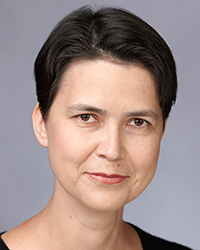Marketa Trimble

What's the most important thing you are working on right now?
Professor Paul Goldstein (Stanford) and I are completing the fifth edition of our casebook “International Intellectual Property Law: Cases and Materials.” The fifth edition adds the fascinating recent developments in international and transnational intellectual property law, such as transnational disputes concerning patents on standards (e.g., LTE and 4G standards), the trend toward the protection of non-traditional trademarks (e.g., smell and taste marks), and copyright issues arising from the dissemination of works on the Internet. The developments also include the negotiations and conclusions of recent free trade agreements that contain intellectual property law chapters, and investor-state disputes involving intellectual property rights. Our casebook is used by professors in a number of U.S. and foreign law schools, and I am looking forward to teaching from the new edition in the spring 2020 semester.
How does your research and scholarship influence your teaching and service and vice versa?
They are frequently intertwined: For example, in the highly specialized intersection of conflict of laws and intellectual property law, I use the casebook that I co-author to teach my “International Intellectual Property” course at Boyd. Most of my research and scholarship involves this area, and even my recent articles on Internet domain name dispute resolution and the legal issues of geoblocking concern problems in this area. My research and scholarship are interwoven with my service as well: For example, I consulted on a joint project between the World Intellectual Property Organization and the Hague Conference on Private International Law, and I serve on the International Law Association’s Committee on Intellectual Property and Private International Law, which is drafting guidelines relating to the difficult issues that exist at the intersection of conflict of laws and intellectual property law.
How do you approach teaching your favorite topics? Your least favorite?
All topics are my favorite topics when I have inspiring students in my classes! Students are one of our great assets at Boyd, and I enjoy teaching the talented and diverse students who take my courses. For difficult topics I use visual aids, I discuss illustrations that are drawn from recent cases, and I apply the newly-covered material to local scenarios. Students have reacted positively to my use of realtime online class polling, which employs multiple choice questions to examine their knowledge and understanding of topics we have just covered in class. I leave as much time as possible for student questions and emphasize that we often focus on the most difficult policy questions – questions for which no one has, and often cannot have, definitive answers.